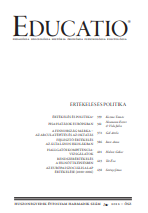Az Európai Szociális Alap értékelése (2000–2006)
Evaluation of the European Social Fund (2000–2006)
Author(s): János SetényiSubject(s): Economy, Education, Labor relations, Evaluation research, Transformation Period (1990 - 2010), Socio-Economic Research, EU-Legislation
Published by: Akadémiai Kiadó
Keywords: European Social Fund; evaluation process; 2000-2006; labour market;
Summary/Abstract: The author here relates, in part, the history of the European Social Fund’s (ESA in the period 2000–2006) evaluation process, and also covers, in part, the culture, models and patterns of an international evaluation team. As a contribution to the general aims of the European Commission, ESA mobilized the labour market of Europe – and 8–10 million workers and students moved, mainly from East to West, to seek out new opportunities for work and study. This is one of the biggest social innovations in the history of the European Union, one which was caused by labour market forces (Eastern unemployment, Western levels of income). The author, whilst dealing with further causes of the great migration, additionally mentions the new and rapid developments in communications (ICT, transportation). One great experience noted from the fact of international cooperation in evaluating ESA was the importance of cultural differences among participant evaluators. While the English partner represented professionalism and high-level technical training, Italians brought ideological preparedness to such cooperative work; and while the Spanish partner had great experience in Hispanic evaluations, a small but forceful German team contributed its specifically German cultural background to the international task. The Hungarian team was in an intermediary position amid these different evaluation cultures.
Journal: Educatio
- Issue Year: 21/2012
- Issue No: 3
- Page Range: 438-448
- Page Count: 11
- Language: Hungarian

